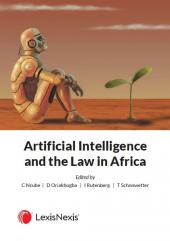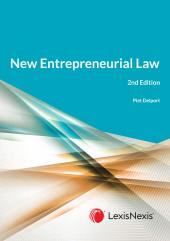Artificial Intelligence and the Law in Africa
This book brings together thought leaders who bring different subject field lenses to legal questions raised by the rapid deployment of AI in Africa.
One Year Subscription Only Terms
Subscribers receive the product(s) listed on the Order Form and any Updates made available during the annual subscription period. Shipping and handling fees are not included in the annual price.
Subscribers are advised of the number of Updates that were made to the particular publication the prior year. The number of Updates may vary due to developments in the law and other publishing issues, but subscribers may use this as a rough estimate of future shipments. Subscribers may call Customer Support at 800-833-9844 for additional information.
Subscribers may cancel this subscription by: calling Customer Support at 800-833-9844; emailing customer.support@lexisnexis.com; or returning the invoice marked 'CANCEL'.
If subscribers cancel within 30 days after the product is ordered or received and return the product at their expense, then they will receive a full credit of the price for the annual subscription.
If subscribers cancel between 31 and 60 days after the invoice date and return the product at their expense, then they will receive a 5/6th credit of the price for the annual subscription. No credit will be given for cancellations more than 60 days after the invoice date. To receive any credit, subscriber must return all product(s) shipped during the year at their expense within the applicable cancellation period listed above.
Product description
This book brings together thought leaders who bring different subject field lenses to legal questions raised by the rapid deployment of AI in Africa.
Collectively the contributors examine national, sub-regional and regional frameworks regulating artificial intelligence. It is becoming increasingly difficult to consider human flourishing without considering the impact of artificial intelligence in all spheres of human endeavour. These spheres range from employment contexts to agriculture and climate-change adaptation technologies.
As we see regulators across the world attempt to regulate artificial intelligence, through legislation such as the Artificial Intelligence Act of the European Union, African states are mooting how to best approach regulation. This volume provides insight into critical legal questions and suggests appropriate approaches.
Table of contents
Chapter 1 - Setting out the challenges and opportunities of artificial intelligence for Africa, by Caroline B Ncube, Desmond O Oriakhogba, Tobias Schonwetter and Isaac Rutenberg
Chapter 2 - A technoscience approach to law as technology and the gendering of artificial intelligence policy in South Africa, by Laura A Foster
Chapter 3 - Artificial Intelligence and Human Rights in Africa, by Jake Okechukwu Effoduh
Chapter 4 - De-regulate and re-regulate: Artificial intelligence and data governance in Africa, by Hanani Hlomani
Chapter 5 - The possible future of African democracy in the age of artificial intelligence, by Justice Alfred Mavedzenge and Otto Saki
Chapter 6 - Genderless human input and artificial intelligence in digital credit: A closer look at unintended consequences, by Ogochukwu Monye
Chapter 7 - Beyond intellectual property protection: Other artificial intelligence intellectual property strategies for the African context, by Chijioke I Okorie
Chapter 8 - The challenges and potential of artificial intelligence interventions in weak public-health systems in Africa, by Omowamiwa Kolawole
Chapter 9 - Just because you can, doesn't mean you should: The case for and against utilisation of artificial intelligence for indigenous knowledge curation and preservation in Kenya, by Angeline Wairegi and Melissa Omino
Chapter 10 - Labour law as a technology for humanising work in the digital era, by Debbie Collier
Chapter 11 - The use of artificial intelligence in legal process and business, by Inge Papp and Ifeoluwa Olubiyi
Chapter 12 - Artificial intelligence and legal ethics in Africa: Forcing uncomfortable decisions, by Cecil Abungu and Nduta Muhindi
Chapter 13 - Artificial intelligence in the African energy and mining sectors: Legal and regulatory review, by Kennedy Chege and Victoria R Nalule
Chapter 14 - Agriculture in Africa: The emerging role of artificial intelligence, by Titilayo Adebola and Ebuka Ibeke
Chapter 15 - The regulation of artificial intelligence tools for environmental impact assessment: Learning from the practice of impact analysis in French-speaking sub-Saharan Africa, by Pag-yendu M Yentcharé and Samuel Sedami
Chapter 16 - Policy and legal recommendations to tackling the challenges and seizing the opportunities of artificial intelligence in Africa, by Caroline Ncube, Desmond Oriakhogba, Tobias Schonwetter and Isaac Rutenberg




